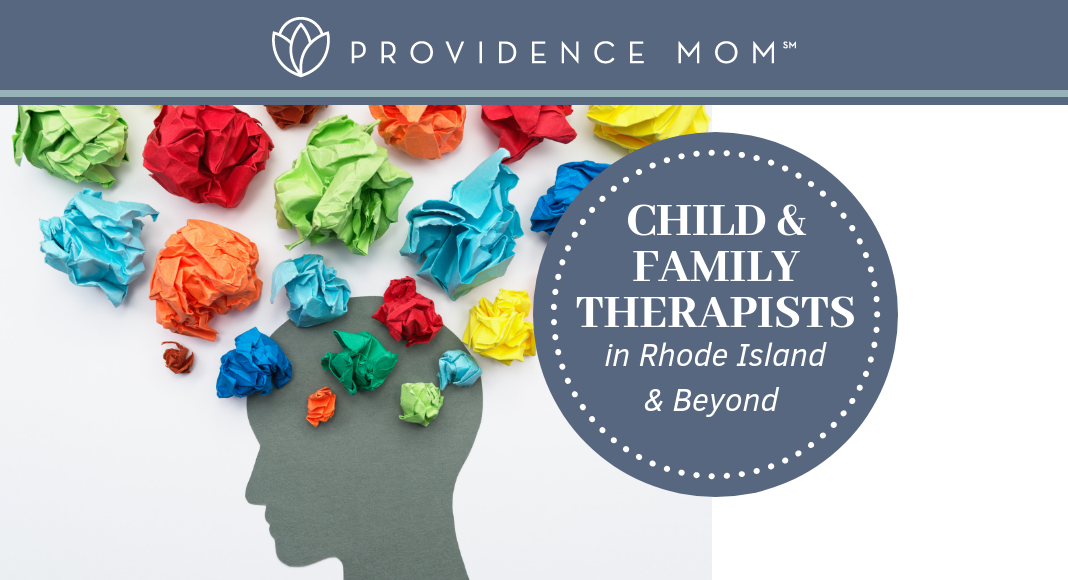
When you think your child may benefit from mental health services it can be difficult to even know where to start. Alana DiMario is a Licensed Mental Health Therapist and a contributor for PMB, so we asked her to lend us some professional advice on how to help your child get the help they need with getting completely overwhelmed. Scroll down to find a list of Child & Family Therapists in Rhode Island.
Therapy can help with a number of things that may be impacting a child’s functioning and enjoyment of their life, such as anxiety, depression (which often looks like irritability/anger in children), self-regulation concerns, navigating divorce, or sleep issues. As a parent, you don’t need to worry about diagnosing your child or determining what mental health services they may need. If you feel like your child is being held back from participating in typical activities of childhood, or if you feel like family life is impacted by a child’s emotions or behaviors, it’s worth seeking out support and coaching for them and yourself. Family counselors and therapists typically do not perform psychological testing or prescribe medications, but they can make referrals for these services if needed.
Trying to find a therapist can feel overwhelming, but there are a few ways to get some leads. The first is by working through your insurance company’s list of local providers who see children and families. Many insurance companies maintain a searchable database on their website, but you can also call and have a list sent to you. From there, ask for recommendations from your child’s pediatrician or school to see what names from that list are trusted by others in your circle. It can also be helpful to check out local parenting groups on Facebook to get suggestions for therapists that people have found helpful. Some providers work on their own in private practices and some work in larger agencies where you may want to request someone specific.
Once you have a few names, give them a call to check on availability. Sometimes there may be a wait to get in to see someone, which may help you make your decision. Typically there will be an initial visit where the therapist will learn more about your child and your family, and you will have the chance to learn about their approach. Most therapists who see children include parents in many sessions, and will typically schedule parent-only sessions periodically. The goal should be for the therapist to guide you in effective ways to support your child’s emotions and behavior at home, so you want to make sure that both you and your child feel comfortable with the therapist you choose.
It will be helpful to give some information to your child before this first visit. This may include the fact that at this appointment they will just be talking, there won’t be any shots or medicine. It is helpful to frame therapy as something that will help your whole family live life the way you all want to, giving more specific information about that depending on your child/family’s unique situation in an age-appropriate way.
As you begin therapy, keep in mind that therapists work best with feedback! If you like specific “homework,” say so. If you are seeing things at home that your child isn’t reporting to the therapist, schedule a parent meeting to address it. The process of therapy should be something that improves your family life and your confidence as a parent to your child, so don’t be afraid to help shape things toward that goal.
The Center for Psychology and Learning {Cranston}
Child and Family Psychiatry Inc. {Cranston}
The NeuroDevelopment Center {Providence}
Rhode Island Pediatric and Adolescent Mental Health | Bradley Hospital {Riverside}
Broadway Psychotherapy {Providence}
Neuro Performance Group {Providence}
The Providence Center {Providence}
RI Behavioral Health and Substance Abuse Treatment | Gateway Healthcare {Pawtucket}
Morin Therapy {North Providence, Pawtucket, Woonsocket}
The Inner You Counseling Center {Johnston, Cumberland, Glocester}
Anchor Counseling Center {Cranston, East Providence, East Greenwich, Lincoln}
Children | Child & Family {Providence}
Thundermist Health Center {Woonsocket}
Thrive Behavioral Health, Inc. {Warwick}
Robert A. Walker and Associates {Warwick}
Gershon Psychological Associates, LLC {Warwick}
Thundermist Health Center {Wakefield, West Warwick}
South County Child & Family Consultants {Peace Dale}
The Inner You Counseling Center {Warwick}
Couple and Family Therapy Clinic South Kingstown
Trauma Recovery & Mindfulness Therapy Services Westerly
Home Page – Delta Consultants of South County, Inc. Wakefield
RICBT | Cognitive Behavior Therapy RI North Kingstown
Child & Family Middletown
Children in Balance Middletown
Newport Community Mental Health Center Middletown
VALLEE Associates in Psychology Bristol
Charis Counseling Centers Barrington
RICBT | Cognitive Behavior Therapy RI Barrington









